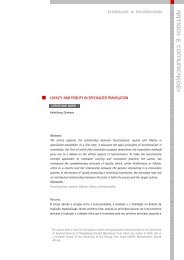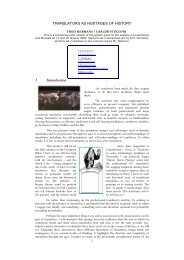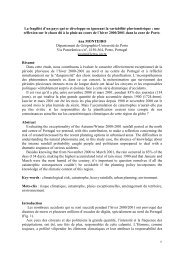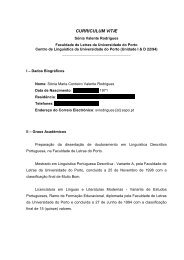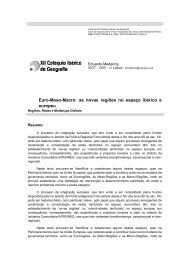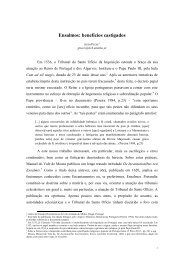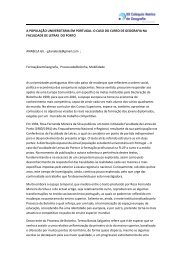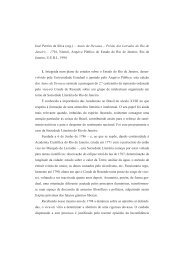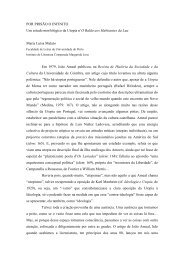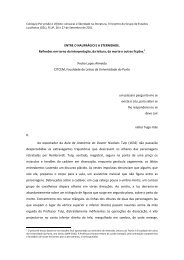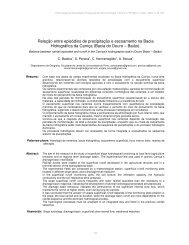Varieties of English: South African English by Vanessa Reis Esteves ...
Varieties of English: South African English by Vanessa Reis Esteves ...
Varieties of English: South African English by Vanessa Reis Esteves ...
Create successful ePaper yourself
Turn your PDF publications into a flip-book with our unique Google optimized e-Paper software.
a political activist in <strong>South</strong> Africa, and which has several generations later produced a local<br />
“variety <strong>of</strong> <strong>English</strong> which mixes features <strong>of</strong> Indian, <strong>South</strong> <strong>African</strong>, Standard British, creole and<br />
foreign language learning <strong>English</strong>es in a fascinating way” (Crystal 2003: 356). One such feature<br />
is the use <strong>of</strong> question tags:<br />
Now in many varieties <strong>of</strong> <strong>English</strong> throughout the world the rules are too complex because you have a choice<br />
<strong>of</strong> pronouns, you have a choice <strong>of</strong> verbs- you could say “isn’t”, “aren’t”, “weren’t”, “didn’t”, “don’t”. And in many<br />
varieties <strong>of</strong> <strong>English</strong> one universal tag is used, and in India it is “isn’t it?” So you would say “Jill is your sister,<br />
isn’t it?”, or “You are coming, isn’t it?” In <strong>South</strong> Africa this has stabilized, and we’ve reduced it even further to<br />
simply “isn’t?”. So you would say “Joan is coming, isn’t?”, and that means “Joan is coming, isn’t she?. Or “He<br />
did it, isn’t?”, and that means “He did it, didn’t he?” (Mesthrie R. in Elmes: 2001: 93).<br />
Pronunciation<br />
There are a number <strong>of</strong> distinctive sounds which distinguish the pronunciation <strong>of</strong> <strong>South</strong> <strong>African</strong><br />
<strong>English</strong>. One should start <strong>of</strong>f <strong>by</strong> stressing the fact that <strong>South</strong> <strong>African</strong> <strong>English</strong> is non-rhotic. This<br />
means that the letter R in words like water and butter is not pronounced. The /r/ in the final<br />
position <strong>of</strong> a word will only be pronounced in the case <strong>of</strong> it being followed <strong>by</strong> a word beginning<br />
with a vowel sound:<br />
Vowels<br />
“In rhotic accents, r is pronounced wherever it is orthographically present: for example, in run, barrel, beard,<br />
war, worker. In non-rhotic accents, r is pronounced in only two situations: in syllable-initial position (as in run)<br />
and inter-vocalically (as in barrel). In such accents it does not occur post-vocalically (as in beard, war, worker)<br />
unless a vowel follows, so that in the writer’s friend no r is pronounced, but it is pronounced in the writer is my<br />
friend.” (McArthur, 2001:13)<br />
Much can be said on this subtopic <strong>of</strong> SAE. The following subsection aims to highlight a few <strong>of</strong><br />
the most common characteristics that are to be found. <strong>South</strong> <strong>African</strong> <strong>English</strong> has what is called<br />
a “kit-bit split”. This can be considered as being the most distinctive feature <strong>of</strong> SAE. Basically it<br />
means that the words kit [kɪt] and bit [bət] do not rhyme: The sound [ɪ] is used when it occurs<br />
next to velars (consonants which are articulated with the back part <strong>of</strong> the tongue [the dorsum]<br />
against the s<strong>of</strong>t palate, the back part <strong>of</strong> the ro<strong>of</strong> <strong>of</strong> the mouth, known also as the velum) as in<br />
the case <strong>of</strong> the following words: kiss, gift, lick, big, sing and kit after /h/ (hit), at the beginning <strong>of</strong><br />
a word as is the case <strong>of</strong> the word “inn”, and before /ʃ/ (fish). Some speakers also use this<br />
sound before /tʃ or dʒ/. On the other hand, [ə] is used before words such as limb, dinner, limited<br />
and bit.<br />
In Cultivated and General SAE the pronunciation <strong>of</strong> /æ/ is slightly raised (as in trap). However,<br />
in Broad varieties, it is <strong>of</strong>ten raised to [ɛ]. This means that /æ/ almost becomes /ɛ/ for some<br />
speakers, as can be exemplified <strong>by</strong> the typical SAE pronunciation <strong>of</strong> the very name <strong>of</strong> the<br />
country <strong>South</strong> Africa, which is pronounced as <strong>South</strong> Efrica.<br />
The /ʊ/ sound in the word foot is generally pronounced as high, back centralised [ʊ]. It is<br />
interesting to note that there is very little lip rounding in comparison to other L1 varieties <strong>of</strong><br />
<strong>English</strong> worldwide. The pronunciation <strong>of</strong> [ʊ] with added lip-rounding only occurs in Broad SAE in<br />
the case <strong>of</strong> Afrikaans <strong>English</strong>.<br />
The /ɑː/ vowel sound in the case <strong>of</strong> words such as bath is usually a low and fully back, [ɑː]. This<br />
low and fully back [ɑː] distinguishes SAE from the other <strong>South</strong>ern Hemisphere varieties (AusE<br />
and NZE). Another indicator <strong>of</strong> SAE is the unstressed vowel at the end <strong>of</strong> words such as happy,<br />
which is usually half-long.<br />
Consonants<br />
Plosives<br />
The following voiced and voiceless plosives (a consonant sound which is produced <strong>by</strong> stopping<br />
the airflow in the vocal tract) are distinctive in <strong>South</strong> <strong>African</strong> <strong>English</strong>: /p, b, t, d, k, g/. These



